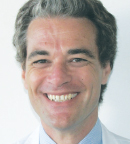
The evidence falls short, and further studies are needed with a longer follow-up, controlling for surgical expertise and including a control arm.— Axel Le Cesne, MD
Tweet this quote
“The debate about perioperative chemotherapy in localized high-grade soft-tissue sarcoma is never-ending. Can this study resolve the debate?” asked formal discussant Axel Le Cesne, MD, of the Institute de Cancerologie Gustave-Roussy, Villejuif, France. “Surgery remains the standard of care for all patients with resectable soft-tissue sarcoma,” Dr. Le Cesne stated.
Previous studies evaluating adjuvant and neoadjuvant therapies in soft-tissue sarcoma have been limited by small numbers of patients, inadequate doses of chemotherapy, and short follow-up, and these studies did not take into account the histologic diversity of soft-tissue sarcoma, he said. “Despite this, neoadjuvant chemotherapy with anthracycline plus ifosfamide is the treatment of choice in marginally resectable soft-tissue sarcoma in referral centers, and the current findings of the study validate our routine practice in high-grade, high-risk patients with soft-tissue sarcoma,” he continued.
Further Studies Needed
However, Dr. Le Cesne did not endorse anthracycline/ifosfamide as a new standard of care, because in his view, the evidence falls short, and further studies are needed with a longer follow-up, controlling for surgical expertise and including a control arm without chemotherapy.
Dr. Le Cesne suggested that the suboptimal results in the histology-driven treatment arms could be due to the low number of cycles given in this setting to obtain a benefit (compared with those observed in advanced diseases) and by different biology between localized vs advanced soft-tissue sarcomas. However, he went as far as to say that the next European Society for Medical Oncology (ESMO) guidelines could incorporate neoadjuvant anthracycline/ifosfamide as an option to be discussed with patients who have a high-risk soft-tissue sarcoma of the extremities and/or trunk wall. ■
Disclosure: Dr. Le Cesne reported no potential conflicts of interest.


